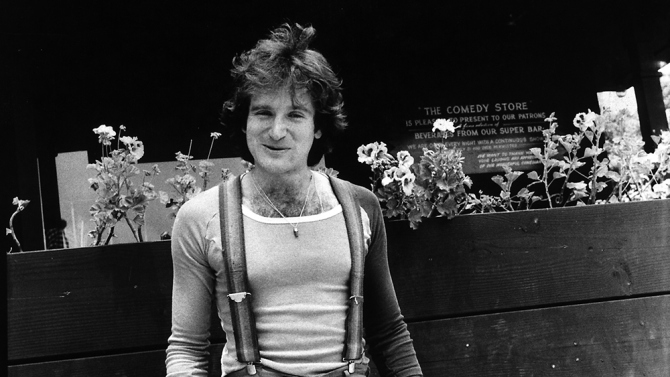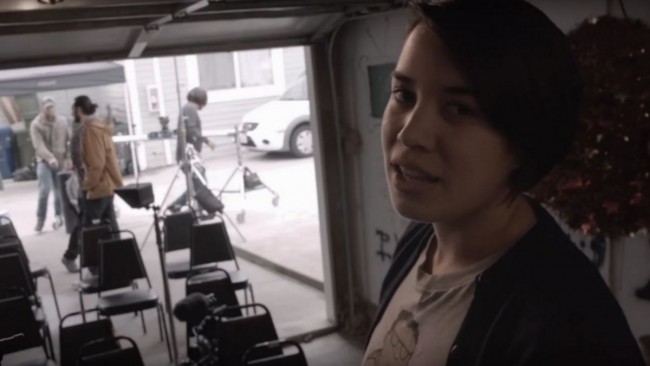You want to be able to quote his inspirational movie lines back to him, to step on a desk and shout to him, “O Captain! My Captain!”
You want to be able to hug him close and tight and never let go, telling him, “It’s not your fault.”
And then you want to throw him the curve, twirl him around and shout, “Fosse! Fosse! Fosse!”
But you cannot do that today. You cannot comfort him now. It’s a particularly cruel and agonizing irony, this outpouring of grief so massively disproportionate, equal but opposite to the loneliness of an icon held in the vice grips of severe depression. Not like this. No. Not like this.
Robin Williams died a week ago at the age of 63, by choice. Perhaps the most irrational, impulsive, irreversible of choices, but it was his to make. Not ours, certainly. But a choice we’re all left with — fortunately, he left us with so much more. The memories. The inspiration. The compassion. An amazing source of light and energy, given professional acting training of the highest order, combined with a natural genius for mimicry and improvisation that burned down the stage and left everyone but himself catching their breath.
Williams earned three Academy Award nominations for Best Actor (Good Morning, Vietnam; Dead Poets Society; The Fisher King) within five years, then won the Oscar for his supporting role as the therapist in 1997’s Good Will Hunting.
Five Grammy Awards, two Emmy Awards, two Screen Actors Guild Awards, four Golden Globes also honored his acting body of work.
His filmography so long and varied I could name 12 films I like and still miss another dozen you preferred, whether because they appealed to your serious sensibilities, or you grew up in a different era where his family films affected you more deeply.
But before all that, he was a baby born in Chicago to a formal model and to a Ford Motors executive on July 21, 1951. Because of his father’s work, young Robin grew up first in the suburbs of Chicago, then Detroit, then San Francisco’s northern lights of Marin County. After studying acting locally, he got into Juilliard, where his classmates in NYC in 1973 included Willilam Hurt, Mandy Patinkin and Christopher Reeve, who’d become his lifelong friend.
The San Francisco Bay Area would become both his home and his second comedy home since the 1970s, though — even if he’d need to go Hollywood to break big.
Williams hit The Comedy Store stage and impressed and/or intimidated all of the other comedians. Richard Pryor almost immediately grasped the obvious and gave him a part in Pryor’s NBC variety special. ABC knew a star when it saw one and signed him on, putting him in an episode of the nation’s #1 TV show, Happy Days, and his Orkan alien proved so popular he decided to revisit Earth again in 1978 for Mork & Mindy.
That same year, HBO showcased his manic glow for the world to see in Live at the Roxy.
He’d follow that up with his first Grammy-winning album, “Reality…What a Concept,” to kick off the 1980s. At decade’s end, he’d produce two more Grammy-winning works, “A Night at the Met” and “Good Morning Vietnam!” “Robin Williams Live 2002” would net him an additional Grammy statue.
He’d earned a SAG for The Birdcage, Golden Globes for Good Morning, Vietnam! and Mrs. Doubtfire, the honorary Cecil B. Demille Award and a special achievement Golden Globe for his voiceover work in Aladdin.
Because Hollywood didn’t have rules or categories to constrain or to celebrate him.
Williams introduced us to characters too big for three-camera sitcoms — his Mork begat the fourth camera, just to keep our eyes trained on him in every possible scene, not wanting to miss another magical moment.
And then, as Mork, he introduced a younger generation to Jonathan Winters, reminding us all of another manic genius of the stage who had inspired Williams.
Williams’ rule-breaking also made him every talk-show host’s favorite guest.
David Letterman enjoyed both the longest professional and personal relationship with Williams in show business, as he recalled on Monday night.
Williams, like Letterman, had survived open-heart surgery.
But Williams, unlike just about any man, opened his heart to just about everyone.
Perhaps the less fortunate you felt about life, the more fortunate you felt after an encounter with him.
There was, of course, his leadership efforts to aid America’s homeless over the course of two decades through Comic Relief, rallying our best comedians to put on a show to raise some dough. Watch as co-hosts Billy Crystal and Whoopi Goldberg attempt to keep up with Robin’s riffs at the opening of Comic Relief VI.
Williams also served the cause overseas to boost military morale through USO shows over the decades. Here is a memorable moment from several years ago when Williams visited Camp Arifjan, Kuwait.
And if you were sick and in need, Williams could lend a hand. This is the ad that ran last Thanksgiving for St. Jude’s Children Research Hospital.
Even animals knew how deep to love him back. Take Koko the Gorilla.
That encounter was filmed 13 years ago. The Gorilla Foundation in northern California reported that when phone calls delivered the news of Williams’ death to them on Aug. 11, “Koko became very somber, with her head bowed and her lip quivering.”
And the comedians.
From the stand-ups he sent money to decades ago to apologize for borrowing their premises, to the young improvisers in theaters from New York City to Chicago to California who eagerly welcomed him as a guest member of their troupes for long-form jams.
Four years ago, he opened up to Marc Maron about his life and career in a way most had never heard. His WTF podcast interview is reposted here, so you can hear him talk about his struggles with depression and addiction, as well as the joys of comedy and being around other comedians.
[Robin Williams on WTF with Marc Maron]
Everyone in comedy for the past 40 years owes a bit of divine inspiration to Williams. They’ll just have to pay it forward now.
His widow, third wife Susan Schneider, posted this public statement:
“Robin spent so much of his life helping others. Whether he was entertaining millions on stage, film or television, our troops on the frontlines, or comforting a sick child — Robin wanted us to laugh and to feel less afraid.
Since his passing, all of us who loved Robin have found some solace in the tremendous outpouring of affection and admiration for him from the millions of people whose lives he touched. His greatest legacy, besides his three children, is the joy and happiness he offered to others, particularly to those fighting personal battles.
Robin’s sobriety was intact and he was brave as he struggled with his own battles of depression, anxiety as well as early stages of Parkinson’s Disease, which he was not yet ready to share publicly.
It is our hope in the wake of Robin’s tragic passing, that others will find the strength to seek the care and support they need to treat whatever battles they are facing so they may feel less afraid.”
Podcast: Play in new window | Download | Embed
Subscribe: RSS


